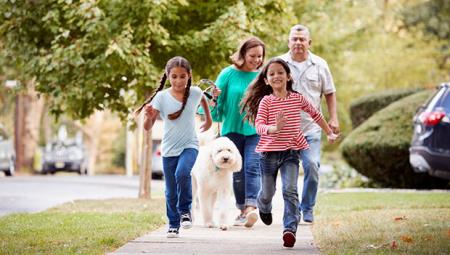
Then they're probably heading back to gym class, too. But don't think that means they'll be getting enough exercise to stay healthy, fitness experts say.
Physical education classes alone won't keep students in shape, said Diana Everett, executive director of the Texas Association of Health, Physical Education, Recreation and Dance, a nonprofit organization for educators. Kids should also find healthy after-school activities they enjoy, she said, even if it's something not traditionally considered exercise.
PE Isn't Enough
In a week, Everett said, some students have only 90 minutes of physical education. But her organization recommends that kids get that much activity each day.
And doing more after school, she said, carries other benefits. Instead of thinking of exercise as something they have to do, such as gym class, kids can find healthy activities they like to do, too.
"Start now," said Jason Dudley, a health and wellness team leader for YMCA Dallas. "Don't wait for a convenient time, because you'll never do it. There is always something going on that you can get your child involved in."
Make Exercise a Family Routine
One key for getting kids to be active is for parents to be active, too, experts say. Take the whole family for an after-dinner bike ride, or take a walk around the neighborhood, or head to the back yard to toss a Frisbee. Kids often see parents placing a high value on their work life, Dudley said, and taking family time to be active shows kids that fitness is important, too.
"It might not be a sweat-drenching workout, but it shows the children that it's important in the eyes of the parents," he said.
Forming such routines can have added benefits, Everett points out. It gets adults to exercise, and it helps children form healthy habits at an early age.
"It's a whole lot easier to teach them while they're young than to teach us while we're older," she said. "Children innately like to move. They don't worry about sweat or about getting their hair messed up."
Melinda Smith, coordinator for health and physical education at the Plano, Texas, school district, regularly makes time to swim, walk or bicycle with her 5-year-old son.
"We don't say, 'We're going to exercise,'" she said. "We say, 'Let's go do something fun.' And we make sure it's active."
Beyond Organized Sports
Don't place too much emphasis on organized sports, either, experts say. Put up a basketball hoop near your garage; encourage children to go outside and play with friends; or enroll them in gymnastics, soccer or ballet classes to see what they shine at.
"You're going to go through a whole list of things before the kiddo latches on to one," Dudley said. "And when they do that, encourage it."
Sailing, fishing, yoga, Pilates, rock wall climbing, skateboarding, horseback riding and even riflery are healthy activities that get children outdoors and onto their feet, experts say. Even some chores have the added benefit of getting children outdoors--raking leaves, for example. Smith said her family washed their car together in the driveway "just to stay active."
Playing tennis as a family or Rollerblading together are also good options, she said.
"You want to think about activities that don't require lots of equipment," Smith said. "Just something you can do together to stay active."
Encourage Unstructured Play Time
Parents should also encourage kids to simply get out and play. Some parents put too much emphasis on signing children up for sports camps, and kids don't get much unstructured outdoor time, Everett said.
"There is so much structured organization by adults for children that we're not allowing them to structure their own time anymore," she said. "Children need to play--to be physically active, to create games of their own or to play sandlot baseball."
But for parents in two-income households, that raises a delicate issue. Many families worry about kids playing outdoors without a parent's supervision--and if kids arrive home before parents do, many end up in front of a television or a computer, Dudley said.
For those families, Dudley said, there is no good answer. But enlisting a friend or neighbor can often help solve the problem. If a child's friend has parents who arrive home early, encourage those two children to play together in the afternoon. Or seek out after-school centers with physical activities that get kids moving around.
"Parents now remember being children themselves and running around, playing, before the Xbox," he said. "They assume kids will be kids and they'll be fine. They don't realize the effects that significant amounts of sedentary time are going to have on these children."









Discuss This Article